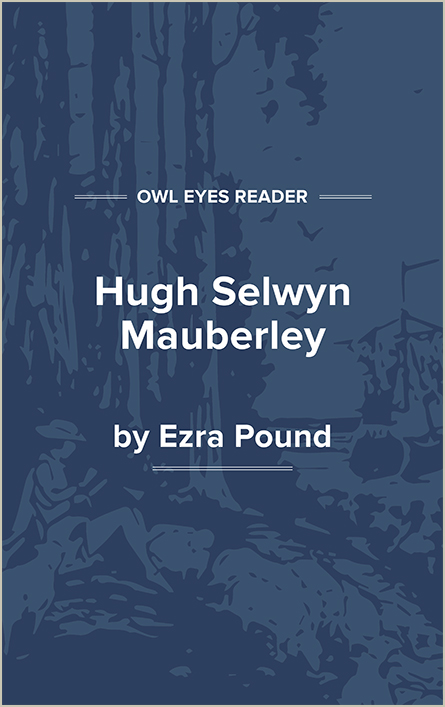Study Guide
Ezra Pound Biography
Ezra Loomis Pound is a controversial poet, the lasting stature of whose poetry is greatly argued but whose importance as one of the central figures in the shaping of twentieth century literature is not. Pound was born on October 30, 1885, in Hailey, Idaho. His family moved eighteen months later to Pennsylvania, eventually settling in a suburb of Philadelphia. His first taste of Europe, where he would spend the majority of his life, came in 1898, when he traveled there for three months with his great-aunt.
Early in life, Pound declared his intention to learn all there was to know about the art of poetry. After studying at Hamilton College in upstate New York and at the University of Pennsylvania, Pound resigned a teaching job in 1907 to travel to Italy and seek his literary fortune. While living in Venice, he published at his own expense his first book of poetry, A Lume Spento. Armed with copies of the book for introduction, Pound headed for London, at that time the most vital center of literary activity in the English-speaking world. He especially wanted to meet the Irish poet William Butler Yeats; soon he was meeting regularly not only with Yeats but also with many other leading writers of the time. A brash American given to bohemian dress and loud declarations, Pound became a leading figure in the avant-garde attempt to revolutionize modern art and literature.
In 1912 Pound spearheaded the Imagist movement, the most visible product of a widespread attempt to rid modern poetry in English of embellishment and conventionalism. Although he edited the first anthology of Imagist poetry in 1914, he had already moved on by that time to involvement in vorticism, an art and literary movement in London that constituted England’s most important early contribution to the modern revolution in art. During this period, Pound was helping to change the common perception of literature through dozens of articles, promoting the work of innovators such as T. S. Eliot, James Joyce, Robert Frost, the painter and writer Wyndham Lewis, and the sculptor Henri Gaudier-Brzeska, editing the important papers of Ernest Fenollosa, and all the while writing and translating poetry. In countless ways, Pound worked tirelessly and sacrificially on behalf of what he regarded as genuine art; many of the then-unknown writers whose work he championed were later recognized as having changed the direction of modern literature.
Ironically, Pound’s own poetry lagged behind his critical pronouncements and the work of those he promoted. Largely conventional in form, his best early poetry derived from his work with Chinese poetry. He pioneered controversial but ultimately vindicated methods of translating poetry that were very influential on poet-translators throughout the twentieth century.
Pound announced his full status as a significant modern poet with the publication in 1920 of Hugh Selwyn Mauberley, a long poem that details in a thoroughly modern style his disillusionment with the British literary establishment in particular and Western culture in general. Moving abruptly from scene to scene, with compressed allusions to art, literature, and politics from ancient Greece to World War I, the poem was the most striking example of modernism in poetry to that date. It paved the way for the archetypal modernist poem, Eliot’s The Waste Land (1922), whose final shape was greatly determined by Pound’s editing.
Pound’s disgust with the timidity and conventionalism of British culture led him to move to Paris in 1921. He again became involved with the literary avant-garde; among the young writers whose work he singled out for praise was Ernest Hemingway. By this time, Pound was fully at work on the Cantos, an epic poem that would occupy him for the rest of his life.
In 1924 he moved to Rapallo, Italy, where he became enamored with the Fascism of Benito Mussolini and increasingly obsessed with the...
(The entire page is 957 words.)
Owl Eyes subscribers get unlimited access to our expert annotations, analyses, and study guides on your favorite texts. Master the classics for less than $5/month!

